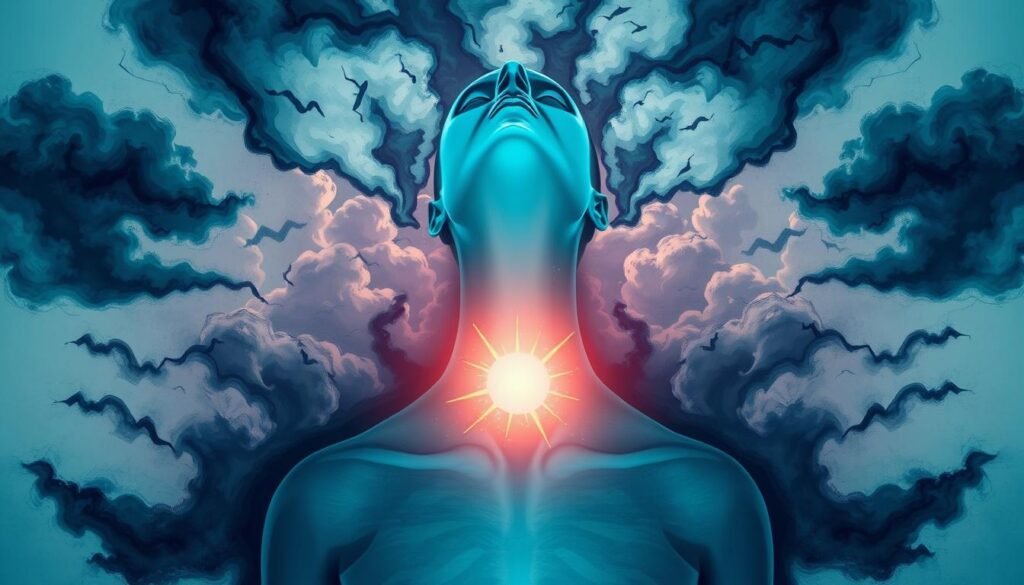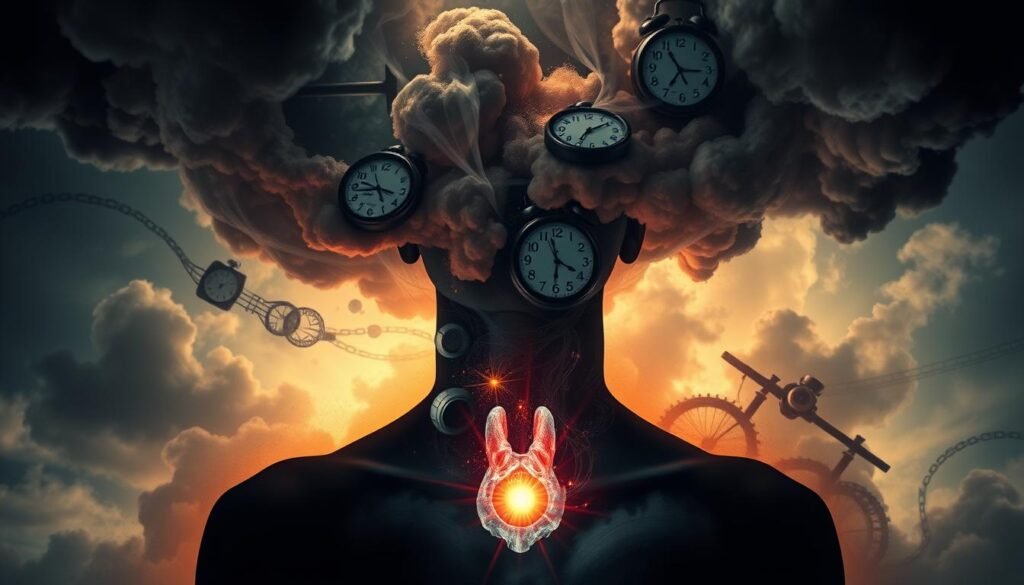Did you know recent studies show women suffer from severe psychiatric conditions due to hormonal imbalances? These imbalances often stay unnoticed but are very important. Hormones act as vital messengers in our bodies. They play a big part in controlling our emotions and health. When something goes wrong with these hormones, it can lead to distressing physical and mental symptoms.
Understanding the link between hormones, our bodies, and our mental health is key. It helps us see how disorders, stress, and big life changes like menopause can make mental health issues worse. This section will help us delve into this complex relationship.
Key Takeaways
- The link between hormonal imbalances and mental health issues is significant and often overlooked.
- Endocrine disorders can manifest not only through physical symptoms but also psychiatric symptoms such as anxiety and depression.
- Life stages such as menopause can further complicate the relationship between hormones and mental health.
- Hormone Replacement Therapy (HRT) is emerging as an alternative treatment for mental health conditions associated with hormonal fluctuations.
- Research continues to evolve, indicating that a deeper grasp of women’s hormonal health is needed to address these challenges effectively.
Understanding Hormonal Imbalances
Hormonal imbalances can come from many sources, impacting both body and mind. Stress, eating habits, genes, and how we live play roles. These imbalances show through symptoms like mood changes and depression. Particularly, women experience changes during menstruation, pregnancy, and menopause. These stages can greatly affect their feelings.
It’s important to notice these symptoms early. They tell us when to seek help and find ways to manage them. Understanding the endocrine system is key. It includes important glands such as the thyroid and adrenal glands. This knowledge helps us see the link between hormonal shifts and mood disorders.
Studies show that changes in hormones like estrogen and testosterone can greatly affect our mood. For example, low testosterone in men can make them feel down and unmotivated. In women, changes in hormones after giving birth can lead to postpartum depression. To learn more about hormones and mental health, read here: hormones and mental health.
Making changes in our lifestyle can ease symptoms of hormonal imbalance. Exercising regularly, eating well, and getting enough sleep can help balance hormones and boost mood. For those with PCOS, eating whole foods and nutrient-rich meals can manage symptoms. Find out more about diet for PCOS here: PCOS nutrition strategies.
The Role of Hormones in the Body
Hormones are essential messengers in the body. They control many functions like metabolism, growth, mood, and fertility. These substances come from different glands and affect our physical and mental health deeply. For instance, serotonin affects our mood, while cortisol helps us deal with stress. These hormones are connected, showing how our minds and bodies work together.
A lot of Americans suffer from endocrine disorders, which can affect their mood. About half of the women between 30 to 60 years old have faced issues due to hormone imbalances. Shockingly, 72% did not link their symptoms to hormonal problems at first. Symptoms like mood swings, hot flashes, and gaining weight were common. Yet, fewer women recognized signs like urinary problems and forgetting things as related to hormones.
Women and men experience hormonal changes differently. Women’s changes are more sudden and can affect their mood and mental health sharply. Hormonal swings during pregnancy, premenstrual syndrome, and menopause can cause both physical and mental issues. Symptoms include cramping and bloating, but also anxiety and trouble sleeping.
Specialists recommend custom plans to fix these imbalances. Solutions might include changing your diet, exercising more, or medical treatments. The aim is to improve life and mental health. Studies show that dealing with both physical and mental sides of hormonal changes can lead to a better balance.
| Symptom | Percentage of Women Identifying Symptoms |
|---|---|
| Mood Swings | 67% |
| Hot Flashes | 67% |
| Weight Gain | 67% |
| Urinary Incontinence | 46% |
| Memory Loss | 46% |
| Anxiety | 50% |
| Depression | 50% |
How Hormonal Imbalances and Physical Symptoms Affect Mental Health
Hormonal imbalances can really affect your mental health, often leading to depression and anxiety. When you have these imbalances, you might see physical signs that make emotional problems worse. This can create a cycle where your body and mind keep affecting each other. It’s important to understand this link to help improve mental health.
Impact of Hormones on Mood Disorders
Hormones like estrogen and testosterone can really impact your emotions. For example, people with Polycystic Ovary Syndrome (PCOS) are much more likely to feel anxious or depressed. Also, thyroid issues can look a lot like depression. Many women feel really irritable before their period, which can make mental health challenges tougher.
Connection Between Physical Symptoms and Mental Wellbeing
Physical issues from hormonal imbalances, like feeling tired all the time or having chronic pain, can hurt your mental health. Most people with endometriosis feel depressed, and many have anxiety too. Big changes in your life, like pregnancy or menopause, can also affect your mental health. This shows how connected your physical and mental health are. To take care of both, think about making some changes in your lifestyle. To get more information on dealing with hormonal problems, check out this page on PCOS and health here.
Key Hormones Influencing Mental Health
Hormones like serotonin, cortisol, and thyroid ones are key to our mood and emotions. They help control how we feel. When they’re not balanced, we might face mood swings and mental health challenges. Recognizing these effects is crucial for emotional well-being.
Serotonin and Its Role in Mood Regulation
Serotonin helps us feel good and keeps our mood stable. If serotonin levels drop, we may feel anxious or sad. It’s important for our brain’s health. Keeping serotonin levels balanced helps prevent hormonal changes and mood disorders.
Cortisol’s Connection to Stress and Anxiety
Cortisol helps us handle stress but too much can be harmful. It can cause anxiety and sadness if levels stay high. Managing stress helps lower cortisol, which can ease thyroid issues and anxiety.
The Importance of Thyroid Hormones
Thyroid hormones impact our metabolism and mood. Too much or too little can make us feel off or anxious. They can lead to weight changes, tiredness, and mood shifts. Balancing these hormones is key for good mental health.

| Hormone | Function | Mental Health Implications |
|---|---|---|
| Serotonin | Mood regulation | Low levels linked to depression and anxiety |
| Cortisol | Stress response | High levels contribute to anxiety and depression |
| Thyroid Hormones | Metabolism control | Imbalances linked to mood changes |
For more info on hormones and mental health, check out this resource.
Common Symptoms of Hormonal Imbalance
Hormonal imbalances affect both your body and mind in many ways. Our bodies use over 50 different hormones to keep things running smoothly. So, even small changes can cause big problems. Common hormone imbalance symptoms include:
- Fatigue
- Mood swings and anxiety
- Weight changes
- Skin issues such as acne
- Menstrual irregularities
- Sleep disturbances
For individuals assigned female at birth (AFAB), symptoms may include heavy periods, hair loss, or vaginal dryness. Those assigned male at birth (AMAB) may see fewer body hairs, have troubles with erectile function, or lose muscle mass. Conditions like an underactive thyroid or Cushing’s syndrome often lead to gaining weight. On the other hand, an overactive thyroid can cause anxiety.
Many things can cause hormone levels to change. This includes life stages like puberty, pregnancy, or menopause, and also stress, certain medicines, and using steroids. Problems like tumors or damage to hormone-making glands can cause long-term hormone issues. Diseases that attack these glands can also change hormone levels. For example, benign growths can mess with how hormones are made.
It’s really important to notice these symptoms. Not paying attention to signs like changes in mood, weight, or sleep can make things like anxiety or depression worse. This shows how closely our physical and mental health are linked.
To figure out if you have a hormonal imbalance, doctors might do a physical check-up, look at your health history, run some lab tests for hormone levels, and use ultrasounds to see if there’s anything unusual with related organs. Treating hormonal imbalance can include hormone therapy, medicines to lower male hormones, and changes to your lifestyle. It is all done under a doctor’s care.
| Symptom | Potential Cause | Impact on Physical Health | Impact on Mental Wellbeing |
|---|---|---|---|
| Fatigue | Hypothyroidism | Low energy, slowed metabolism | Increased risk of depression |
| Mood Swings | Menstrual cycle changes | Physical discomfort, tension | Greater anxiety and irritability |
| Weight Gain | Cushing’s syndrome | Obesity risks, metabolic issues | Lower self-esteem, emotional distress |
| Acne | Polycystic ovary syndrome (PCOS) | Skin problems, self-image concerns | Increased social anxiety |
Endocrine Disorders and Their Mental Health Impact
It’s crucial to understand how endocrine disorders affect mental health. Conditions like thyroid problems and adrenal issues greatly influence it. They can cause irritability, mood swings, anxiety, and depression.
These hormonal imbalances impact more than just the body. They can affect emotional well-being and life quality too.
Thyroid Issues and Anxiety
Thyroid problems, including too little or too much hormone, can upset emotions a lot. People with these issues may face various mental health symptoms.
- Hypothyroidism often leads to tiredness, low mood, and irritability.
- Hyperthyroidism can make someone feel more anxious, restless, and even cause panic attacks.
Understanding thyroid health’s role in anxiety is key. It helps in treating both the mind and body better.
Adrenal Fatigue and Stress Management
Prolonged stress can cause adrenal fatigue. It messes with cortisol levels, raising anxiety and stress. Symptoms of adrenal fatigue include:
- Chronic tiredness and feeling burnt out
- Mood swings and emotional ups and downs
- Problems with focusing or concentration
Dealing with stress well is vital for adrenal fatigue. Knowing the link between adrenal issues and stress encourages better mental care. Methods like regular physical activity, eating well, and managing stress help maintain emotional health.

Menopause and Mental Health Changes
Menopause marks a time of big hormone changes, mainly a drop in estrogen and progesterone. This shift can cause mental health issues, including more anxiety and depression. Women may face mood swings and physical problems that affect their mental health.
Effects of Estrogen and Progesterone
Lower levels of estrogen and progesterone during menopause can cause several psychological problems:
- Anger and irritability
- Anxiety and feelings of sadness
- Low mood and loss of self-esteem
- Forgetfulness and poor concentration, often called ‘brain fog’
- Difficulty finding words
These symptoms show the strong link between menopause and mental health. Bad sleep patterns, for instance, lead to irritability and anxiety. This can start a hard-to-stop cycle.
Dealing with Anxiety and Depression during Menopause
Combating anxiety and depression during menopause means using several strategies. Here are some treatments:
| Treatment Option | Description |
|---|---|
| Cognitive Behavioral Therapy (CBT) | A type of therapy that aims to change thought patterns to better manage emotions. |
| Hormone Replacement Therapy (HRT) | A treatment that uses medication to replace missing hormones and ease menopause symptoms. |
| Counseling | Professional help to deal with the emotional struggles of menopause. |
| Mindfulness Techniques | Activities like meditation and yoga that help with relaxation and emotional stability. |
Self-care is key for good mental health during this time. Activities like mindfulness, yoga, and talking with peers can be very supportive. Making lifestyle changes such as eating well, exercising, and controlling caffeine and alcohol intake also helps a lot.
Getting advice from medical professionals is important, particularly for those with past depression. Being aware of the need for full support can make managing menopause and mental health easier.
Testosterone Imbalance Effects on Mental Health
Testosterone changes can heavily affect our mental health. They change our mood and feelings, for both men and women. It’s key to understand that low testosterone is linked with different symptoms of hormone imbalance.
How Low Testosterone Can Affect Mood
When testosterone is low, our moods can shift a lot. We may feel irritable, tired, or sad. Research highlights that women, especially after ovary surgery, can quickly feel worse mentally. This hormonal change can lower our drive and worsen life quality.
In men assigned at birth, not having enough testosterone or having hypogonadism can lead to serious mood issues. This can cause anxiety, deep depression, or mood problems because of substance use. The signs of low testosterone often cover:
- Sudden mood changes
- Lack of interest or motivation
- Chronic fatigue
- Social withdrawal
- Difficulties concentrating
- Sleep disturbances
As we get older, testosterone levels naturally go down. This makes us more likely to face these symptoms of imbalance. If these issues get worse, they can add to already existing mental health problems. A well-rounded treatment plan is crucial.
Noticing signs of low testosterone early is vital. If you see these symptoms, getting medical advice is a smart move. Good treatment can lessen hormonal and mental health issues.

Holistic Approaches to Managing Hormonal Imbalances
Finding effective ways to handle hormonal imbalances is key. It calls for a full approach, mixing health of both mind and body. By making changes in daily life, a person can get better overall and fix their hormone levels.
Lifestyle Changes for Better Hormonal Health
Making smart changes in life can deeply affect your hormones. Sleeping well is vital for keeping hormones in balance. If sleep goes wrong, it can mess up your metabolism. Not using screens before bed helps your sleep and boosts melatonin.
- Nutrition: Eating less sugar helps with insulin, and a protein-rich breakfast can help control hunger, aiding in managing weight.
- Healthy Fats: Medium-chain fatty acids and omega-3s are good for insulin management and general health.
- Physical Activity: Regular workouts make hormone receptors more sensitive, improving insulin reaction.
- Stress Management: Dealing with stress through mindfulness and relaxation helps reduce stress hormones, tackling hormonal imbalances.
Therapeutic Options and Treatments Available
Besides lifestyle changes, there are treatments for hormone balance. Hormone Replacement Therapy (HRT) eases menopause symptoms. Also, natural options like herbs help with reproductive hormones. Research shows these methods have real benefits.
| Treatment Option | Description | Potential Benefits |
|---|---|---|
| Hormone Replacement Therapy (HRT) | A clinical approach involving the administration of hormones. | Relieves symptoms like hot flashes and mood swings. |
| Herbal Supplements | Natural remedies to support hormonal balance. | May improve fertility and regulate menstrual cycles. |
| Cognitive Behavioral Therapy (CBT) | A psychological approach addressing stress and anxiety. | Can decrease cortisol levels and improve mental health. |
Conclusion
Hormones play a big role in how we feel mentally and emotionally. It’s vital to understand the link between hormones and our mental health. This is especially true during key life stages like menopause. People should watch for signs of mood changes then.
Studies show that 12.7% of men and 21.3% of women will face major depressive disorder (MDD) in their lives. This shows how closely depression is linked to our hormonal health. Hormonal shifts can cause physical symptoms that make anxiety and depression worse. This is often seen in women during menopause and their reproductive years.
Understanding these links is key. It helps individuals and doctors create better treatment plans together. Quick action and the right help can improve emotional well-being and life quality. For more details, check out this resource on hormones and mental health.